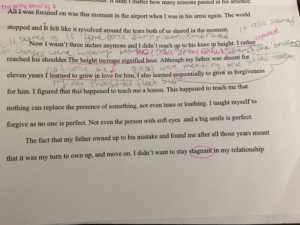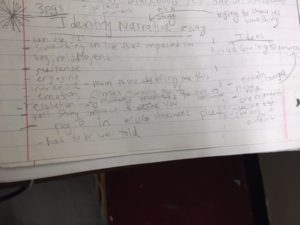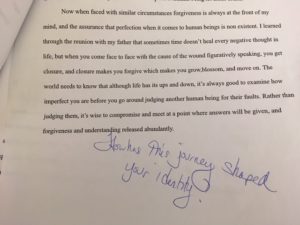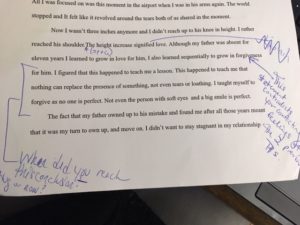
Identity Narrative
When I Saw him Again
I first remembered being lifted up with strong arms and put on broad shoulders. From his shoulders I felt like a hawk on the top of the world. My father’s big smile and kind eyes always looked at me with care. But years later my father couldn’t be found. It’s as if I searched and searched through memories and at the end I found no memories of him. It’s as if the memories drifted off with time. After my father disappeared from my life and came back in the time frame of eleven years, I learned to forgive him for his absence, and this helped me grow as person socially.
I saw him again eleven years later in 2018. The moment in the airport was meaningful. The reappearance of my father made me feel like a detective investigating a foreign substance that has never been seen before. Although in this case I have seen my father before, when I saw him at the airport I felt like I barely knew him. I pondered whether this was the same father that sat me on his shoulders. As I got closer to him, I took time to observe my so called father. His shoulders were broad, but drooping to the side as an effect of aging. Although time took a toll on the structure of his shoulder, I noticed that time couldn’t manage to steal the softness in his eyes, and the cloud of water developing in his eyes. I then took a moment to look down at his quivering lips, then at his arms that embraced me ever so gently. I then closed my eyes and took the moment in. Thoughts in my head were working like wires in a clock. Anger and sadness intertwined in my heart. I proceeded to ask myself, “How can a father manage to not share the same air with a child he helped create for over a decade?” And “why did he go astray from his child in the first place.” As he hugged me tighter my blood was churning. I was having intense qualms on whether he loved me enough. But then a voice sedated my cunning thoughts. The voice reminded me of a few lost memories. His presence was so calming and soothing that it unmasked the few lost memories stolen by his absence.
My father’s presence also knocked some sense into my thought pattern. I first realized that those thoughts that were going through my mind before his calming presence were filled with so much anger. They were filled to so much anger that they distracted me from what I’ve been wanting and searching for which was his presence. I started to reel in the fact that my father was there with me at that instant. From that moment I knew that this was the same man. This was the same look, these arms were the same arms, and this smile was the same big smile. All my questions absconded and fled away into thin air. It didn’t matter how many years he was gone for, how many days, seconds or milliseconds. It didn’t matter how many seasons passed in his absence. All I was focused on was this moment in the airport when I was in his arms again. The world stopped and It felt like it revolved around the tears both of us shared in the moment.
While it seemed as if time froze during our embrace, during that moment it also seemed that changes were happening between me and my father’s broken relationship. My negative thoughts took flight, broken pieces were also mending, and in their place newer eye opening realizations developed. I started realizing how much smaller he looked next to me when reminiscing back to the times when I sat on his shoulders. It dawned on me that I wasn’t the three inch toddler being seated on broad shoulders anymore and I surely didn’t reach up to my father’s knee in height. I rather reached his shoulder when I stood side by side to him at the airport. I took it upon myself to look at the height increase as a signifier of love. Although my father was absent for eleven years I learned to grow in love for him, I also learned sequentially to grow in forgiveness for him. I figured that this happened to teach me a lesson. This happened to teach me that nothing can replace the presence of something, not even tears or loathing. I taught myself to forgive as no one is perfect. Not even the person with soft eyes and a big smile is perfect.
The fact that my father owned up to his mistake and found me after all those years meant that it was my turn to own up, and move on and I did. I didn’t want to stay stagnant in my relationship with my father. As humans it is not healthy to focus on the past when you’re trying to move ahead to the future. The past is like a trap that lures its victims and feeds off their reminisce and humiliates them as a consequence. If I would’ve not forgiven my father, I would’ve not have became the wise person I am today when similar situations arise. I would’ve shut out everyone who came from the past, and erased forgiveness out of my dictionary. I would’ve decreased in love for my father, and expected him to be a perfect human being let alone father.
Now when faced with similar circumstances forgiveness is always at the front of my mind, and the assurance that human beings are perfect is always non-existent. This journey which has been eye opening has also mainly shaped me into becoming a merciful person. I learned through the reunion with my father that sometimes time doesn’t heal every negative thought in life as much as forgiveness does. I learned that when you come face to face with the cause of the wound figuratively speaking, you get closure, and closure makes you forgive which makes you grow, blossom, and move on. The world needs to know that although life has its ups and down, it’s always good to examine how imperfect you are before you go around judging another human being for their faults. Rather than judging them, it’s wise to compromise and meet at a point where answers will be given, and forgiveness and understanding released abundantly.
Self Reflection
I became one with my words, and I truly felt like an author. I found ways to play with my words, in order to make the reader feel the power of the moment that I was talking about. Although I found ways to make certain words stick out, I had to work on connecting some of my previous paragraphs to the following, so I had to backtrack and then proceed. I couldn’t see that I had to move my readers along between paragraphs, and I thought I was doing so effectively, but I needed another pair of eyes that was looking at my writing from a different perspective to make me see this. This is where Professor Rodwell’s comments came into play. She clearly referred me to paragraphs, and I knew what to fix and work on immediately. This goes to show that although I became one with my words, I needed peer reviewing, constantly re reading and going over my writing to make my writing better.
When it comes to the six rhetorical situations, as a writer I did my best to incorporate them effectively. I needed a moment or something that really impacted me and changed me. For the exigence part, I picked the moment of me and my dad meeting at the airport after over a decade because it was a powerful moment. I was motivated by this moment not only because it was powerful, but because this moment itself motivated me and made me powerful as well. It made me grow and improve as a person. This moment served a huge purpose in my life because it made me more forgiving. Hopefully it also made my audience understand the power of forgiveness as well. At first I was targeting a general audience, but as I kept writing, I wanted to target others who have a heavy heart. I wanted to show people who don’t forgive as easily that forgiveness helps everyone feel better, and it is one of the precious gifts of humankind. Although my personal essay wasn’t a speech but rather an essay, I wanted my words to jump out at the readers and ring in their ears and resonate with them. Because I wanted my words to resonate with my readers, I didn’t start with the moment in the beginning. I built up to the end which is when I met my father at the airport. I wanted to lead on my reader and make them interested to find out what was going to happen next. I did this by transitioning my ideas, and the thoughts going on in my head while I was seeing my father again. I designed it in such a way that my words could be seen as a manual for my audience.
I read a fiction piece by Kate Chopin called,”A Pair of Silk Stockings” and I also read a nonfiction piece by Joan Didion called, ”On going home”. Both of these pieces gave me the contextualization and essence of what a narrative essay should include. Both pieces had a character who was trying to find their identity or found their identity, and they showed how they were impacted after finding their identity or even questioning their identity. The protagonist in Kate Chopin’s “A Pair of Silk Stockings” really helped me in my writing process. She taught me that sometimes it takes an unexpected moment to help you find yourself. For example, the protagonist thought that she was going to spend the money that she surprisingly found in her pocket on her children, since she always put their needs in front of hers. Long story short she spent it on herself and in the end she found that she needs to take care of herself also. While writing, this helped me write the part about how I didn’t expect my father’s reappearance in my life to teach me how to forgive. I thought that I would still be a little angry with him. But I learned to let go, and I learned that i’m a better human being if I am merciful. Both me and the protagonist in Kate Chopin’s “A Pair of Silk Stockings” found something about themselves they knew nothing about before.While editing my essay I developed the habit of trying to envision explaining something to my younger sibling. The helped me explain the who, what, where, how, and why of what I was speaking about in my essay. Another strategy that helped me was coming back and rereading my writing. This helped make my writing the best it could be to my potential. When it comes to recognizing key rhetorical terms and strategies, which made my writing better, I made sure to imply my motivation for what I was writing about, my purpose, my audience, the design,context and genre of my writing. Peer review helped me develop my rhetorical terms and strategies. My fellow classmates asked me to clarify on certain parts of my essay which helped me cover the design, context, genre, motivation, and purpose of what I was talking about. My fellow classmates also helped me when it came to seeing how my audience understood my essay. One of my classmates thought my wording was too difficult, while Professor Rodwell didn’t. I had to decide whether to keep those words or not. In the end I decided to keep those word, and I explained whether the words I chose were meant to show emotion as professor Rodwell asked me to include .
As the author of my narrative essay, I felt that I did the best I could when it comes to getting my emotions and transitioning my audience from one idea to the next. There is always room for improvement, and I will make my next essay much better after looking at the comments Professor Rodwell gives me on my this essay. If there is something that I learned from the writing process of this essay, it’s that I enjoy speaking to my audience and telling them what is on my mind as a writer.
Supporting Documents and what I learned from them




what I learned from them
- I found ways to make certain words stick out, I had to work on connecting some of my previous paragraphs to the following, so I had to backtrack and then proceed. I couldn’t see that I had to move my readers along between paragraphs, and I thought I was doing so effectively, but I needed another pair of eyes that was looking at my writing from a different perspective to make me see this. Peer reviewing helped me to realize this.


